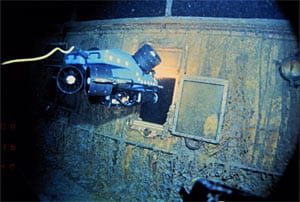News Releases
A First Responder on the Ocean Floor
The Towed Digital Camera and Multi-Rock Coring System, or TowCam, was developed by scientists and engineers at WHOI to meet the U.S. oceanographic community’s need for an imaging and sampling…
Read MoreNatural Petroleum Seeps Offer Clues to the Past and the Future
Just a half mile off California’s coast near Santa Barbara, and in coastal areas around the world, natural petroleum seeps are releasing an astonishing amount of methane gas and oil…
Read MoreUndersea Vehicles to Study Formation of Gold and Other Precious Metals On the Pacific Ocean Floor
An international team of scientists will explore the seafloor near Papua New Guinea in the western Pacific Ocean later this month with remotely operated and autonomous underwater vehicles, investigating active…
Read MoreWoods Hole Engineering Team from Titanic Discovery to be Honored
The underwater research vehicle Jason Jr., which gained international attention for its exploration inside the wreck of the R.M.S. Titanic in July 1986, and its engineering team from Woods Hole…
Read MoreStudy Looks at Ways to Sustain Lobster Fishery
In the world of the lobster fishery, less may indeed be more. A new study may give hope to lobstermen struggling with declining lobster stocks, suggesting new ways that might…
Read MoreCaribbean Corals and Climate Change
Climate scientists are finding interesting clues to ancient climates in the corals of Honduras. During a trip earlier this month, they drilled cores from Montastrea (star corals) and Diploria (brain…
Read MoreArctic Adventure: Following Bowhead Whales
WHOI scientists will be working on the continental shelf near Barrow, Alaska from mid-August to mid-September, trying to determine the oceanographic conditions that make this region a favorable feeding environment…
Read MoreSilent Stingers
Summer brings millions to the beach, and among the creatures often found in coastal waters are jellyfish. One of the most beautiful but potentially dangerous is Physalia physalis, commonly known…
Read MoreA New Era in Observing the Ocean
Marine scientists have their fingers crossed that a long-planned Ocean Observatories Initiative (OOI) will make it through the federal budget process this summer and fall and become a reality. OOI,…
Read MoreArchaeology in the Aegean
An international team of scientists and engineers embarked on the Greek research vessel Aegaeo June 25 for a ten-day survey in local waters. Project PHAEDRA, for Partnership for Hellenic-American Exploration…
Read MoreJellyfish-Like Creatures May Play Major Role in Fate of Carbon Dioxide in the Ocean
Transparent jellyfish-like creatures known as salps, considered by many a low member in the ocean food web, may be more important to the fate of the greenhouse gas carbon dioxide…
Read MoreHurricane Historians
With another hurricane season in full swing and a prediction for a high number of major storms, WHOI geologists are seeking clues from past hurricanes to learn more about the…
Read MoreA Whale Trail
Three marine research laboratories in Woods Hole have teamed up to sponsor a six-foot right whale sculpture, one of more than 50 whale sculptures that are part of this summer’s…
Read MoreUnderwater Microscope Finds Biological Treasures in the Subtropical Ocean
Scientists towing an underwater digital microscope across the Atlantic have found possible missing links to the global nitrogen cycle, which in turn is linked to ocean productivity. In a recent…
Read MoreWHOI Director Steps Down After 12 Years
Robert B. Gagosian announced today that he would step down as president and director of Woods Hole Oceanographic Institution (WHOI), a position he has held since 1994. Citing interests to…
Read MoreSperm Whale Lingo: Clicks and Buzzes Lead to Prey
Scientists from Woods Hole Oceanographic Institution (WHOI) and the University of St. Andrews in Scotland used digital tags (D-tags) attached with suction cups to the backs of sperm whales to…
Read MoreHumans, Mammoths and Horses: The Case of the Fossil Record
Were prehistoric horses extinct before humans arrived in Alaska, or were they hunted to extinction by humans? In a recent paper in the Proceedings of the National Academy of Sciences,…
Read MoreSmoke and Sulfur: Undersea Vehicle Captures Footage of Volcanic Eruption
Dramatic new video of a long-term volcanic eruption in the western Pacific first discovered in 2004 has been captured during a recent cruise by the remotely operated vehicle JASON, developed…
Read MoreOcean Technology Meets Business Needs
Marine scientists and engineers will brief investors, business development executives, commercialization partners and economic development leaders May 24 at a conference at WHOI aimed at showcasing marine technologies and concepts…
Read MoreBarcoding Biota: The CMarZ Cruise Finds New Species In the Ocean Depths
Trying to figure out what tiny creatures live in the ocean is no easy task, but thanks to technology, patience and hard work, scientists have explored a section of the…
Read MoreREMUS and the Coral Reefs
WHOI biologists and physical oceanographers joined forces in May to study the effect of ocean currents on fish larvae spawned on coral reefs in Belize. Collaboration for the pilot project…
Read MoreTest for Dioxin Sensitivity in Wildlife Could Result from New Study
Why are chickens so sensitive to dioxins, but terns seem much more resistant, despite their exposure through eating dioxin-tainted fish? The life-or-death difference researchers have found can be partially explained…
Read MoreWoods Hole Oceanographic Institution Launches On-Line Image Library
The saying “a picture is worth a thousand words” is increasingly true in today’s world as images are used throughout society to entertain, inform and educate. Locating just the right…
Read MoreLinking Climate Change Across Time Scales
What do month-to-month changes in temperature have to do with century-to-century changes in temperature? At first it might seem like not much. But in a report published in this week’s…
Read More
